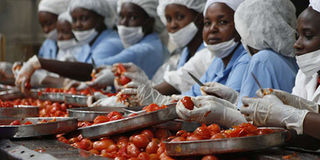Breaking News: At least 10 feared to have drowned in Makueni river
Ways to ensure food safety in agro-processing

Employees sort tomatoes in a jam-making enterprise. Food safety in the agro-processing and hospitality industry is crucial for continued consumer trust and good health. FILE PHOTO | NMG
What you need to know:
- The agro-processing venture must put in place measures that provide transparency and ensure safe operation at the suppliers’ operations.
- Every employer must empower their workers with the latest food safety knowledge to make decisions.
- Internal audits can be tool to close non-conformities and identify new areas from improvement.
- dairy products are kept at right temperatures at all times. Frequent monitoring and inspection of storage facilities must be done always.
Food safety in the agro-processing and hospitality industry is crucial for continued consumer trust and good health. A number of measures must be put in place to ensure safety.
Hygienic environment
A clean, orderly environment eliminates chance of cross contamination. Waste must be disposed off in the right manner using right methods.
Involve suppliers
The agro-processing venture must put in place measures that provide transparency and ensure safe operation at the suppliers’ operations.
For small-scale suppliers of produce like fruits and vegetables, dairy and meat products, who by nature mostly are farmers, the operator must build food safety training programme for either individuals or groups.
Inspect and audit the suppliers’ premises, production processes, storage, handling and transportation to ensure they meet operator’s requirements.
Train workers
Every employer must empower their workers with the latest food safety knowledge to make decisions. The training should focus on areas like cleaning, waste management, food safety protocols, personnel hygiene, cross contamination management, storage and traceability.
A trained employee can identify areas of improvement on matters food safety, improving the system internally.
Regular inspection
Regular inspections are part of a food safety programme, allowing the operator to identify good practices that can be improved periodically.
Inspections can be scheduled depending on risk or past experience, taking into consideration the outcomes of past internal, third party and regulatory inspections by local government agencies.
Internal audits can be tool to close non-conformities and identify new areas from improvement.
Traceability programme
The operator must be able to track backwards and forwards all ingredients in case a problem arises.
Whether manual or computerised, the programme must be able to show the movement of ingredients and other supplies from farm to storage, to market and eventual consumption by the consumer.
Storage processes
Adequate capacity of cold storage should be a priority investment to ensure fruits, vegetables, beef, poultry, fish and dairy products are kept at right temperatures at all times. Frequent monitoring and inspection of storage facilities must be done always.
Get facility certified
With certification, the facility can demonstrate to all parties, internal and external, its food safety credentials that translate to a resilient, auditable, food safety system and better business for the agro-processor.
Makau is based at the Department of Dairy, Food Science and Technology, Egerton University.




